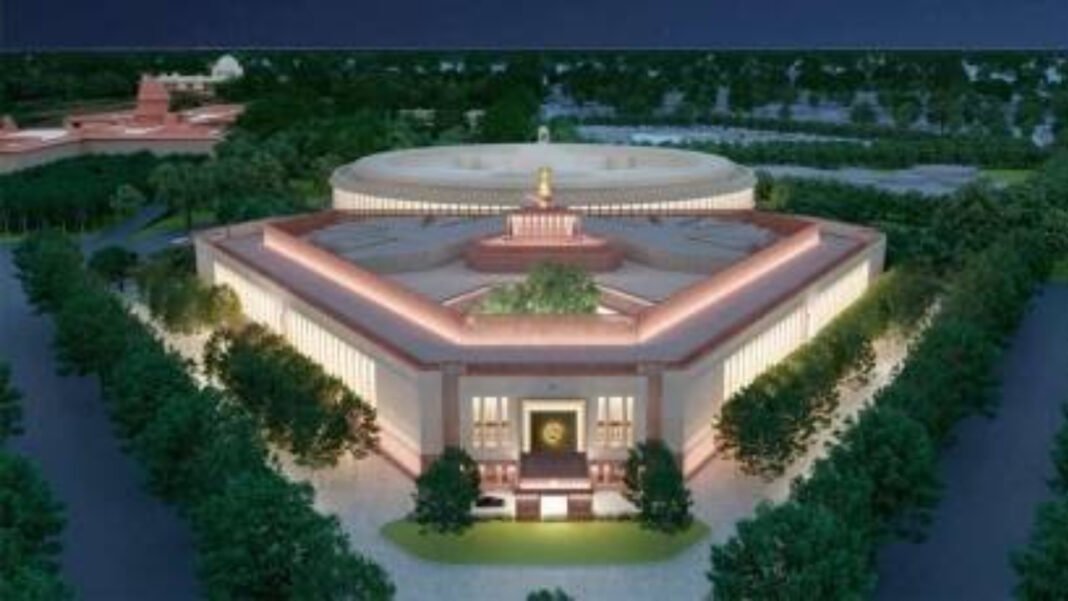By: Dipak Kurmi
The sacredness of how Parliament raises the voices of the voiceless is meant to be enshrined in the metaphorical “temple of democracy.” The old deity is supposed to be carefully and ritualistically relocated with piety when a new temple is built, to continue the metaphor. In the case of Parliament, the divinity of that body is found in the caliber of its debate, its differences, and ultimately its ability to settle those differences, which is impossible without the Opposition. Sadly, because of the opposition’s boycott of the event, the inauguration of the new temple of India’s democracy will lack the sacred spirit of discussions and debates. Actually, the issues raised by the Opposition in Parliament take precedence over those of the government. What good is Parliament if it does not represent the diversity of the people’s will?
Undoubtedly, the opposition parties had never passed up such chances for self-promotion while in office. Chief Ministers or even the PM have officially opened a number of Assembly buildings. However, requesting that the President inaugurate the new Parliament building rather than the Prime Minister is not entirely unreasonable. The Indian President serves as the head of state, and Article 79 of the Constitution states that there will be a parliament for the union made up of the President and two Houses with the titles Council of States and House of the People, respectively. Even if the opposition is just being disrespectful and trying to criticize the formal inauguration, it has nonetheless found a very good excuse to avoid participating in a time of national celebration for India.
The nation is attempting to turn a post-colonial leaf by opening the new Parliament building, leaving behind everything that smells of colonial times. Actually, Lutyens’ design for Delhi represents colonial oppression, and the so-called continuity is just a cover for slavishly indulging in a colonial hangover. Therefore, a new Parliament or capital building is a legitimate requirement for a new country. Because New Delhi was still being built when power was transferred, our founding fathers lacked the resources to lavishly spend money on its construction. The Rashtrapati Bhavan wasn’t finished until 1929, and Parliament House didn’t open until 1927. Thus, these buildings had barely reached their twentieth year when India attained independence.
Nation-building did not entail vanity projects when British malfeasance had caused the starvation deaths of 30 lakh people, bankrupted the country, split it in two, killed more than 10 lakh people, and forced more than 1 point 5 crore refugees to flee their homes. The thrifty Gandhians had more than enough material resources to build the miracle of modern India from what the racist, foreign rulers had left behind. Dreams of building dams, opening universities, supplying surplus milk and malai to feed the world’s hungry people came true, and the map of South Asia was updated to include a new neighboring country. All of this was pure magic, which cannot be explained by brick and mortar. It was all carried out in the outdated structure, whose original British architects would have trembled to imagine what Indians would eventually accomplish while persistently bickering and squabbling with one another.
It’s time for Indian lawmakers to leave the dreary, intimidatingly museum-like building that has housed them for nearly a century and conjures up humiliations from both the past and present. For a resurgent India, there were plenty of good reasons to construct a new capital complex. A vanity project, indeed. But what would be on display is the pride of the country. The old Lutyens’ Delhi was a representation of British imperial haughtiness that needed to be consigned to history, and a new, vibrant representation of an emerging nation had to be constructed in its place. In that sense, everyone should have found the dedication of the new Parliament building to be a magnificent occasion. But it’s being ruined by both the government and the opposition. Indians have an omen-based faith. Not having the Opposition at the event is bad news for Indian democracy.
It’s to the Prime Minister’s credit that he makes a big deal out of every occasion, whether it be the starting of a new train or the opening of a new road, projecting his larger-than-life persona and gaining significant political capital in the process. The Opposition cannot argue with that because it is his genius. Even as liberals argue over whether Mountbatten actually gave this scepter to Nehru as part of the ceremonial handing over of power, the discovery of the story of the Chola scepter adds to the mystique surrounding the management of this event. This museum piece’s historicity can be verified by the image of Nehru holding the scepter while surrounded by Tamil Nadu priests. The replica of a Chola scepter would have undoubtedly captured the attention of Nehru, who had dug deep into India’s past to re-imagine its new nationhood and had brilliantly conceptualized the Ashoka lions as the national emblem.
But only if President Murmu transfers the Chola scepter to PM Modi would its grandeur be increased in the modern democratic context. Even though the presence of non-Brahmin priests from the historic religious institutions of Tamil Nadu would affirm the diversity of Hinduism, their presence inside the Parliament building would be equivalent to giving the event a Hindu religious stamp. Of course, it cannot be said that this is an exercise in modernity while banishing the demons of colonial servitude. The absence of the President will also leave a void that will not be filled by any amount of humor, which is a more significant factor in the boycott of the Opposition. The government still has time to show mercy, as required by democratic decency. After all, a controversy shouldn’t be the start of the new Parliament’s tale. In addition, it shouldn’t have been opened on the day the man who was convicted of murdering the Mahatma was born; rather, it should have happened on the anniversary of the Mahatma’s birth. (The writer is a journalist and commentator based in Guwahati, can be reached at dipaknewslive@gmail.com)












